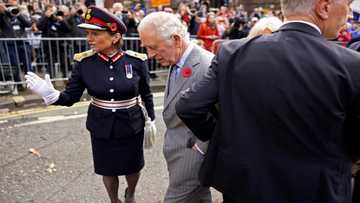Hong Kong protest song replaces China anthem at S. Korea rugby match

Source: AFP
PAY ATTENTION: Сheck out news that is picked exactly for YOU ➡️ find “Recommended for you” block on the home page and enjoy!
Hong Kong's government reacted with fury on Monday after a popular democracy protest song was played instead of the Chinese national anthem for the city's team at a rugby sevens tournament in South Korea.
The city's sports teams play the Chinese national anthem, but before Hong Kong took on South Korea in the final of the Asia Rugby Sevens Series in Incheon on Sunday, "Glory to Hong Kong" was broadcast instead.
The song was written by an anonymous composer during the huge and sometimes violent protests in 2019 and became an anthem for the city's now-crushed democracy movement.
The Hong Kong government "strongly deplores and opposes the playing of a song closely associated with violent protests and the 'independence' movement" in place of China's national anthem, it said in a statement.
"The National Anthem is a symbol of our country. The organiser of the tournament has a duty to ensure that the National Anthem receives the respect it warranted," a government spokesperson said.
In a subsequent statement, Hong Kong's government said the city's chief secretary Eric Chan met Seoul's consul general on Monday "and requested the Korean side to comprehensively look into the incident and responsibilities involved".
PAY ATTENTION: Enjoy reading our stories? Join YEN.com.gh's Telegram channel for more!
The mix-up has engulfed Hong Kong's rugby team in a political row.
Video of the incident showed the players kept straight faces and did not react to the wrong song being played.
Junius Ho, a firebrand pro-Beijing Hong Kong lawmaker, attacked the players for that choice.
"They just let the country be humiliated," Ho wrote on Facebook. "They have completely failed and lost our trust. Now the only solution is to dissolve the Hong Kong rugby team."
Ronny Tong, who serves in Hong Kong's cabinet, said the incident "cannot be a careless mistake" and has likely breached the city's national security law.
China imposed a sweeping security law on Hong Kong in response to the 2019 protests to stamp out dissent.
Its wording claims universal jurisdiction -- Hong Kong and Chinese authorities say they can prosecute people for national security offences committed overseas.
"It is hardly believable that the incident does not involve any assistance provided by people in Hong Kong," Tong wrote on Facebook.
Hong Kong's government said the police had launched an investigation.
'Human error'
Asia Rugby said the error was a mistake and issued an apology to both the Hong Kong and Chinese governments.
"The incident happened due to a simple human error from a junior member of the local organising committee, playing a song downloaded from the internet instead of the correct anthem," the tournament organisers said.
After the final -- which Hong Kong won -- Asia Rugby said apologies were broadcast in the stadium in Korean and English and the Chinese national anthem was then played.
Hong Kong Rugby Union said they had "registered our deepest concern and regret over this incident" with the tournament organisers.
"Whilst we accept this was a case of human error it was nevertheless not acceptable," HKRU said.
China's "March of the Volunteers" was born out of the Communist Party's struggle to liberate the country from Japanese occupation and begins with the rallying cry "Arise! Ye who refuse to be slaves".
It was played at the 1997 handover of Hong Kong to China as colonial Britain departed.
Before the 2019 democracy protests, Hong Kong football fans often used to boo the national anthem, something that infuriated Beijing.
Hong Kong later passed a law that outlawed insults to the anthem. The first person convicted under that new law was jailed last week.
"Glory to Hong Kong" is a similarly rousing composition and was secretly recorded by an anonymous orchestra during the protests.
But its lyrics are about a very different struggle -- freeing Hong Kong from Beijing's control and bringing democracy to the city.
Playing the song in Hong Kong is now all but illegal under the national security law.
In September, a harmonica player who played the tune to a crowd commemorating Britain's late Queen Elizabeth II was arrested.
New feature: Сheck out news that is picked for YOU ➡️ find “Recommended for you” block on the home page and enjoy!
Source: AFP





